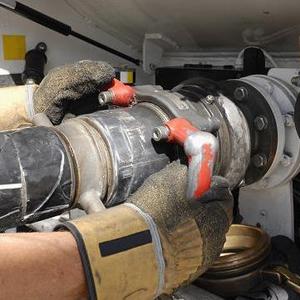State officials say Minnesota ready to move to B20 next year

August 1, 2017
BY Ron Kotrba
Minnesota, the first U.S. state to mandate biodiesel use in 2005, is making history once again as state officials have determined that the increase from 10 to 20 percent biodiesel content in diesel fuel will take effect as planned May 1, 2018.
The state’s biodiesel task force met in June to discuss whether the four statutory conditions have been met to proceed as planned with the milestone increase from B10 to B20. The findings by the commissioners of agriculture, commerce and the pollution control agency demonstrate that the state is indeed ready to make the historic move to B20.
The four statutory conditions that must be evaluated and met before increasing the state’s biodiesel mandate are:
(1) An ASTM specification or equivalent federal standard exists for the next minimum diesel-biodiesel blend;
(2) A sufficient supply of biodiesel is available and the amount of biodiesel produced in Minnesota from feedstock with at least 75 percent that is produced in the U.S. and Canada is equal to at least 50 percent of anticipated demand at the next minimum content level;
(3) Adequate blending infrastructure and regulatory protocol are in place in order to promote biodiesel quality and avoid any potential economic disruption; and
Advertisement
Advertisement
(4) At least 5 percent of the amount of biodiesel necessary for that minimum content level will be produced from a biological resource other than an agricultural resource traditionally grown or raised in the state, including, but not limited to, algae cultivated for biofuels production, waste oils, and tallow.
According to a fact-finding document published by the departments of agriculture, commerce and the state pollution control agency, the issue of adequate blending infrastructure was raised by a representative of Magellan Midstream Partners, a major terminal operator in Minnesota. Incidentally, inadequate blending infrastructure was also the reason the state delayed increasing the mandate from B5 to B10 several years ago. The Magellan representative this summer “asserted that there would be delays in fueling if the B20 mandate was implemented, due to lack of blending infrastructure,” wrote the commissioners of the three departments.
After further investigation, the commissioners concluded that “blending infrastructure and regulatory protocol are in place to promote biodiesel quality and avoid any economic disruption.”
Bruce Heine, vice president of government and media affairs for Magellan Midstream Partners, told Biodiesel Magazine, “We are reviewing our options regarding infrastructure enhancements at our affected terminals and will be actively working with our customers to assess their service needs.”
Once implemented next May, the Minnesota B20 mandate subsequently will be in effect during the state’s “summer months,” or April through September. From October through March, the mandate will revert back to B5, as is current practice with B10.
Advertisement
Advertisement
“Minnesota has been a visionary leader on biodiesel policy for 15 years, starting with passage of the nation’s first statewide biodiesel requirement,” said Shelby Neal, director of state governmental affairs for the National Biodiesel Board. “Over the years, that standard has moved from 2 to 10 percent, and soon 20 percent. Minnesota is where biodiesel policy is headed, and we’re really excited about that future.”
Executives from Renewable Energy Group Inc., the nation’s largest biodiesel producer that operates a 30 MMgy multifeedstock biodiesel refinery in Albert Lea, Minnesota, told Biodiesel Magazine they are excited about the news and ready to deliver.
“Minnesota has been a leader in proving the benefits of higher biodiesel blends and this is another pioneering step toward cleaner air, energy security and value-added agriculture,” said Gary Haer, REG’s vice president of sales and marketing. “REG and our biodiesel industry partners will be ready to deliver the approximately 30 million additional gallons of cleaner-burning biodiesel to Minnesota consumers during the summer months, which will improve both the state’s economy and environment.”
Randy Howard, REG’s interim CEO, said, “We would like to thank the Minnesota legislature, agencies and our industry partners for their ongoing advocacy and cooperation throughout this process. REG is committed to being the leading provider of cleaner, home-made fuel to Minnesota families that improves their quality of life while adding even more value to the state’s economy.”
Neal added, “This is a great move forward for biodiesel and Minnesota. It’s good for the environment as B20 will remove 202,000 cars from Minnesota roads, boost the rural economy with good paying jobs, and add to agriculture producers’ bottom line.”
The commissioners’ findings and determination have been published in the state register, and a letter has been sent to the chairs of the appropriate legislative committees.
Related Stories
Reps. Mike Flood, R-Neb., and Troy A. Carter, Sr., D-La., on July 21 reintroduced the SAF Information Act. The bill directs the U.S. EIA to more explicitly include SAF data in its weekly and monthly reports.
The U.S Department of Energy Bioenergy Technologies Office, in partnership with the Algae Foundation and NREL, on July 21 announced the grand champion and top four winning teams of the 2023 - 2025 U.S. DOE AlgaePrize Competition.
The European Commission on July 18 announced its investigation into biodiesel imports from China is now complete and did not confirm the existence of fraud. The commission will take action, however, to address some systemic weaknesses it identified.
Kintetsu World Express Inc. has signed an additional agreement with Hong Kong, China-based Cathay Pacific Airways for the use of sustainable aviation fuel (SAF). The agreement expands a three-year partnership between the two companies.
On July 18, U.S. EPA announced a reduction in force (RIF) as the agency continues its comprehensive restructuring efforts. With organizational improvements, EPA is delivering $748.8 million in savings.
Upcoming Events










